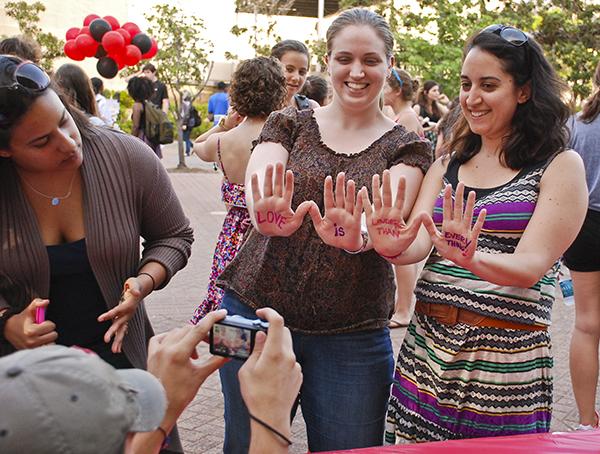Student leaders have planned a month of events to raise awareness about mental health, marking the largest student-led response to last spring’s on-campus tragedies.
The Program Board has teamed up with the Residence Hall Association to promote a series of events, collectively titled “Breaking the Silence,” to complement efforts by the University Counseling Center to start conversations about mental health issues. Organizers said they chose upbeat events, like a concert, walk and community art project, to bring a positive spin to a serious topic.
After three students committed suicide on the Mount Vernon Campus last spring, Program Board Executive Chair Liz Moses said student leaders have looked for ways to promote awareness.
“It is to an effect a reaction to the suicides that happened last semester. Generally speaking, we wanted to take a reactive response to this and look at the state of mental health on GW’s campus,” Moses said.
The University responded to the three deaths by adding permanent counseling services to its suburban campus. Months earlier, GW had announced it would move its counseling and student health centers from K Street to the Marvin Center.
Members of Program Board and RHA said they believed they had a responsibility to ensure conversations about mental health continue on campus – and to create a sense of community instead of isolation.
“Mental illness affects everyone in some way and everyone has experience with it, whether it affects them or someone else. It’s really important for us to continue the conversation,” said Ari Massefski, the president of RHA.
Austin Caldwell, co-community service chair for Program Board, said last spring’s losses still feel “incredibly recent.” Caldwell is also a member of Beta Theta Pi fraternity, which freshman Benjamin Asma had joined before he committed suicide in April.
Caldwell’s co-chair, David Meehan, said he thought it was important for students to physically gather for the cause.
“No matter what references are posted by the University, nothing’s going to hit home like standing in a crowd of 1,000 people thinking about the same things,” Meehan said.
After the deaths of Asma and senior Lynley Redwood, professors cancelled class to speak with students, University President Steven Knapp emailed a letter to parents and the admissions office cancelled tours in West Hall for several days to give students privacy. Resident advisers on the Mount Vernon Campus held extra meetings with students, while mental health groups mobilized to bring permanent services there.
The pair of deaths came three months after freshman Sean Keefer also committed suicide. All three students lived in West Hall.
UCC Director Silvio Weisner said starting conversations about mental health on a college campus requires collaboration among students, faculty and staff. Student organizations can play a vital role, pushing plans and conversations forward because their members are on the “front lines” and can reach different sectors of the community, Weisner said.
“UCC generally has contact only with those students whose mental health issues rise to a certain level of intensity and impact, and while these assessment, consultation and intervention functions are unique to UCC and integral to promoting mental health and wellness, understanding the campus climate is necessary for any outreach, education and promotion efforts,” Weisner said in an email. He declined to sit for an interview.
The month will kick off in Kogan Plaza with a PostSecret art project, inspired by the PostSecret website, which showcases anonymously submitted confessions online and in various pop-up art exhibitions.
At GW, tables will be placed in residence halls starting Sept. 10 for students to write down confessions ranging from the silly, like a song that’s a guilty pleasure, to struggles with depression. The secrets will later be collected and put on display in a collage so students can “see that they are not alone,” Moses said.
The Out of the Darkness Walk, a national walk sponsored by the American Association of Suicide Prevention, will take place Sept. 20 on the National Mall. GW students will meet in Kogan Plaza and head to the walk as a group.
A concert will also be held in partnership with WRGW in Square 80. The artist and date has yet to be announced.
Laura Porter, president of the mental health awareness group SPEAK, said the events could help change students’ perceptions of mental illness by letting them meet people who are affected by it. SPEAK’s programming centers on sharing personal experiences in panels.
“It connects you as a human to know you’re not alone. It’s not an abstract concept when you’re able to put a face to it. To know what someone else is going through and see they’ve overcome it is a really positive thing,” said Porter, a former Hatchet writer.
Porter said her organization had participated in early talks for “Breaking the Silence,” but SPEAK has remained independent from the programming.
Chelsea Padley, president of GW’s To Write Love on Her Arms chapter, said student-supported campus events are instrumental in drawing in students who don’t typically engage in conversations about mental wellness.
“I think with walks or other events it helps to break the stigma, takes out the negative connotation. You see how every other person has problems, it brings to light how this is a normal thing,” Padley said.
GW’s National Alliance on Mental Illness chapter, also known as NAMI, formed during the spring and later became a registered organization.
NAMI is holding its first walk Sept. 20, and co-president Molly Ingalls said the group plans to work with more organizations as it establishes itself on campus.
Ingalls said the most detrimental misconception is the idea that mental illness is caused by a lack of willpower. She said drawing attention to such inaccuracies through events helps students confront stigmas around mental illness.
“It’s just like physical illness, like a brain tumor that can affect how they feel. Mental illness can affect composition of the brain. Mental illness affects the way that we see the world,” Ingalls said.
Avery Anapol and Victoria Sheridan contributed reporting.







